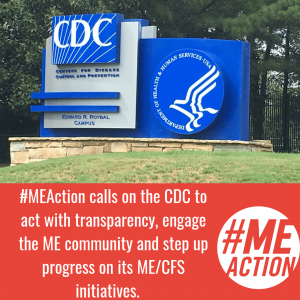The U.S. Center for Disease Control and Prevention (CDC) has initiated various projects focused on myalgic encephalomyelitis / chronic fatigue syndrome (ME/CFS), but there has been very little transparency or engagement with the patient community about the CDC’s overall plans, the approaches being used, or the status of the projects underway.
Further, many of the initiatives appear to have stalled or are moving far too slowly to address the urgent nature of this disease crisis.
#MEAction has sent the letter below to the CDC outlining our concerns about the lack of progress on many of the agency’s ME/CFS projects, as well as the lack of transparency and engagement with the community regarding these projects, especially since the disbanding of our disease’s federal advisory committee, CFSAC.
The letter also calls on the CDC to act with extreme urgency to educate medical groups and providers about the CDC’s recently updated guidelines; and to undertake a large-scale, comprehensive epidemiological study in order to better understand the prevalence and risk factors of ME.
The letter was written by #MEAction’s CDC committee, which is made up of #MEAction volunteers and staff. We’ve asked the CDC directors who oversee the ME/CFS program, Dr. Elizabeth Unger and Dr. Jennifer McQuiston, to respond to our questions within 45 days.
[maxbutton id=”19″ url=”http://www.meaction.net/wp-content/uploads/2019/08/MEAction-Inquiry-on-CDC-MECFS-Initiatives-08-21-19-1.pdf” text=”Read the Letter” ]If you are unable to read the full letter, we have posed detailed questions about the CDC’s work in the following areas:
1. Multi-Site Clinical Assessment of ME/CFS (MCAM) Adult:
This study began in 2011. However, only one paper, on the study methods, has been published. In the face of such urgent need for foundational knowledge about this disease, this pace is unacceptably slow. We expect CDC to significantly accelerate its efforts to complete and publish this study.
2. MCAM Pediatric study:
Very little public information is available and the community has not been involved in this recent study. We expect transparency and prompt answers to some basic questions about this study.
3. Epidemiological research study:
As a result of prior poorly-conducted epidemiologic research, no reliable and comprehensive information exists about prevalence, risk factors, natural history, or prognosis for ME/CFS. CDC must undertake a large-scale, comprehensive, and carefully-designed epidemiologic survey to capture this sorely-needed information.
4. CDC ME/CFS website:
CDC’s website serves as a critical platform for propagating disease-specific knowledge and medical guidelines to providers. Historically, insufficient and even harmful information has been published and, while CDC has taken some steps to improve this content in recent years, many deficiencies remain. We expect comprehensive, appropriate and up-to-date guidance to be regularly published through this venue.
5. Development of CMEs:
Consensus about appropriate clinical management practices is evolving rapidly. Given the demand and urgency for medical education, we expect more frequent development and release of CME materials.
6. Partnership with school nurses:
A year ago, the CDC awarded a contract to the National Association of School Nurses to conduct active surveillance of students with chronic absenteeism, including that caused by ME/CFS as well as other conditions, in schools. One key question is what disease criteria is being used to identify students with ME/CFS.
7. Partnership with Georgia pediatricians:
There is a desperate need for more expert pediatricians nationwide as there is currently only one expert ME/CFS pediatrician who is nearing retirement.
8. CDC Treatment Guidelines Evidence Review:
This evidence review is critical because it will have a profound impact on the recommendations in evidence-based medical education. As has been the case in previous evidence reviews, we are concerned that inappropriate conclusions about treatments will be drawn from studies that include patients with other diseases.
9. Proactive outreach to medical community:
We understand that CDC has conducted efforts to educate the medical community including its website, its biannual medical education roundtable, its recently released CME, contracts with the school nurses and Georgia pediatricians, and presentations at several conferences. These are commendable preliminary efforts.
However, we have a crisis in clinical care that has left patients mistreated and neglected. CDC’s efforts are not sufficient to address the current crisis that has resulted from stigma, lack of knowledgeable clinical providers, and inappropriate guidelines on the sites of some medical societies and medical education providers. One example is Mayo Clinic’s continued recommendations for CBT and GET, as discussed on the NIH call.
[maxbutton id=”19″ url=”http://www.meaction.net/wp-content/uploads/2019/08/MEAction-Inquiry-on-CDC-MECFS-Initiatives-08-21-19-1.pdf” text=”Read the Letter” ]





